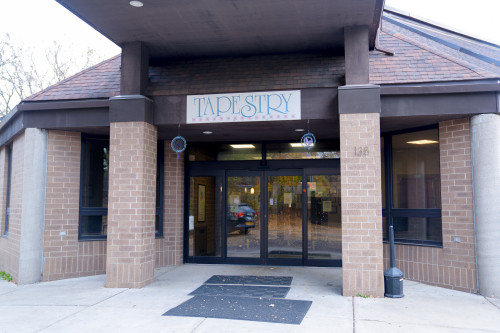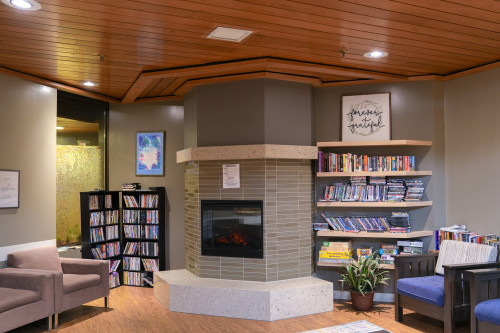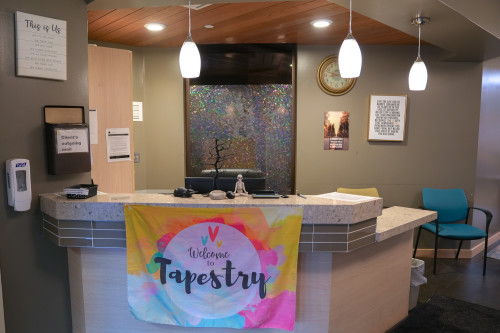






EOSIS Tapestry
Treatment Focus
This center treats primary substance use disorders and co-occurring mental health conditions. Your treatment plan addresses each condition at once with personalized, compassionate care for comprehensive healing.
Primary Level of Care
Offering intensive care with 24/7 monitoring, residential treatment is typically 30 days and can cover multiple levels of care. Length can range from 14 to 90 days typically.
Claimed
Recovery.com has connected directly with this treatment provider to validate the information in their profile.
Treatment Focus
This center treats primary substance use disorders and co-occurring mental health conditions. Your treatment plan addresses each condition at once with personalized, compassionate care for comprehensive healing.
Primary Level of Care
Offering intensive care with 24/7 monitoring, residential treatment is typically 30 days and can cover multiple levels of care. Length can range from 14 to 90 days typically.
Provider's Policy
After determining which program is best for you, a financial adviser will work with you to arrange payment options and work with your insurance company to ensure maximum coverage and reimbursement. Currently we accept most insurance coverage from all major providers. We also have loan options.
EOSIS Tapestry
EOSIS Tapestry
About EOSIS Tapestry
EOSIS is a residential treatment program for women with substance use and co-occurring disorders, providing a comprehensive continuum of care. With a patient-centered and holistic approach, they integrate the mind, body, and spirit of each individual, empowering them on their journey to lasting recovery. As a CARF-accredited program, EOSIS is committed to maintaining the highest standards of care.
Women-Centered Care
The Tapestry Treatment Center specializes in evidence-based therapies, medical services, family support, and medication-assisted treatment (MAT), in addition to mental health services. Their care team creates personalized treatment plans that address each client's unique physical and mental health needs, with a focus on coping skills, relapse prevention, trauma, and female-centered topics. A typical day includes a blend of individual and group therapy sessions, complemented by wellness and social activities that foster holistic healing. The women-only program offers specialized, gender-responsive care while cultivating a strong sense of community among patients. The facility features lounge areas that offer clients a tranquil space for relaxation and recreation between therapy sessions. Situated in St. Paul, this facility is just a three-minute walk from two nearby bus stations, ensuring convenient access to treatment.
Center Overview
Treatment Focus
This center treats primary substance use disorders and co-occurring mental health conditions. Your treatment plan addresses each condition at once with personalized, compassionate care for comprehensive healing.
CARF Accredited
CARF stands for the Commission on Accreditation of Rehabilitation Facilities. It's an independent, non-profit organization that provides accreditation services for a variety of healthcare services. To be accredited means that the program meets their standards for quality, effectiveness, and person-centered care.

Supportive Medication for Recovery
Medication-Assisted Treatment (MAT) is an evidence-based approach that pairs FDA-approved medications with counseling to treat addiction. The medications are used to reduce cravings, ease withdrawal symptoms, or block the effects of substances. More about MAT
Methadone
Methadone

Dolophine®, Methadose®
Methadone is a full opioid agonist, meaning it activates opioid receptors in the brain to produce effects like pain relief and euphoria. It is longer acting than many other opioids, making it useful in medication-assisted treatment for opioid use disorder.
It reduces withdrawal symptoms and cravings by occupying opioid receptors without causing intense highs. Because it is a full agonist, it must be used carefully to avoid overdose, but it is highly effective when taken as prescribed within a structured program.
Naltrexone
Naltrexone

Vivitrol®, Revia®
Naltrexone is an opioid antagonist, meaning it blocks opioid receptors in the brain and prevents opioids from producing effects like euphoria or sedation. It is used to treat both opioid and alcohol use disorders, but does not cause physical dependence or withdrawal.
It helps reduce cravings and the rewarding effects of opioids or alcohol, supporting long-term recovery. Because it blocks opioid effects, it should only be started after a person has fully detoxed from opioids to avoid triggering withdrawal.
Buprenorphine
Buprenorphine

Suboxone®, Subutex®, Sublocade®, Zubsolv®
Buprenorphine is a partial opioid agonist used to treat opioid use disorder. It activates opioid receptors to reduce cravings and withdrawal but has a ceiling effect, meaning it produces less euphoria and respiratory depression than full opioids.
Buprenorphine binds tightly to opioid receptors, blocking other opioids from attaching and reducing the risk of misuse. It's often combined with naloxone (as in Suboxone®) to discourage injection misuse and is available in daily or monthly forms.
This center accepts patients receiving MAT prescribed elsewhere for opioid use disorder, but does not provide MAT.
Note: Treatment centers offer different forms of MAT—such as oral tablets, dissolvable films, or monthly injections—and their policies can vary based on state regulations, provider preferences, and insurance coverage. Because of these differences, it's best to contact the center directly to learn what options are available and what might be right for your situation.
Insurance Accepted
Cash Pay Rates
Estimated Cash Pay Rate
Center pricing can vary based on program and length of stay. Contact the center for more information. Recovery.com strives for price transparency so you can make an informed decision.
Levels of Care






Treatment
Specializations
Alcohol
Using alcohol as a coping mechanism, or drinking excessively throughout the week, signals an alcohol use disorder.
Co-Occurring Disorders
A person with multiple mental health diagnoses, such as addiction and depression, has co-occurring disorders also called dual diagnosis.
Drug Addiction
Drug addiction is the excessive and repetitive use of substances, despite harmful consequences to a person's life, health, and relationships.
Medication-Assisted Treatment
Combined with behavioral therapy, prescribed medications can enhance treatment by relieving withdrawal symptoms and focus patients on their recovery.
Who We Treat
Women only
Women attend treatment in a gender-specific facility, with treatment delivered in a safe, nourishing, and supportive environment for greater comfort.
Approaches
Evidence-Based
A combination of scientifically rooted therapies and treatments make up evidence-based care, defined by their measured and proven results.
Individual Treatment
Individual care meets the needs of each patient, using personalized treatment to provide them the most relevant care and greatest chance of success.
Gender-Specific
Separate treatment for men or women can create strong peer connections and remove barriers related to trauma, shame, and gender-specific nuances.
Therapies
1-on-1 Counseling
Patient and therapist meet 1-on-1 to work through difficult emotions and behavioral challenges in a personal, private setting.
Trauma-Specific Therapy
This form of talk therapy addresses any childhood trauma at the root of a patient's current diagnosis.
Experiential Therapy
With this approach, patients heal by doing. Therapists help patients process difficult emotions to speak, using guided activities like art or dance.
Life Skills
Teaching life skills like cooking, cleaning, clear communication, and even basic math provides a strong foundation for continued recovery.
Medication-Assisted Treatment
Combined with behavioral therapy, prescribed medications can enhance treatment by relieving withdrawal symptoms and focus patients on their recovery.
Motivational Interviewing
Based on the idea that motivation to change comes from within, providers use a conversational framework to discover personalized methods for change.
Psychoeducation
This method combines treatment with education, teaching patients about different paths toward recovery. This empowers them to make more effective decisions.
Relapse Prevention Counseling
Relapse prevention counselors teach patients to recognize the signs of relapse and reduce their risk.
Twelve Step Facilitation
12-Step groups offer a framework for addiction recovery. Members commit to a higher power, recognize their issues, and support each other in the healing process.
Conditions We Treat
Anger
Although anger itself isn't a disorder, it can get out of hand. If this feeling interferes with your relationships and daily functioning, treatment can help.
Anxiety
Anxiety is a common mental health condition that can include excessive worry, panic attacks, physical tension, and increased blood pressure.
Codependency
Codependency is a pattern of emotional dependence and controlling behavior. It's most common among people with addicted loved ones.
Depression
Symptoms of depression may include fatigue, a sense of numbness, and loss of interest in activities. This condition can range from mild to severe.
Post Traumatic Stress Disorder
PTSD is a long-term mental health issue caused by a disturbing event or events. Symptoms include anxiety, dissociation, flashbacks, and intrusive thoughts.
Stress
Stress is a natural reaction to challenges, and it can even help you adapt. However, chronic stress can cause physical and mental health issues.
Suicidality
With suicidality, a person fantasizes about suicide, or makes a plan to carry it out. This is a serious mental health symptom.
Trauma
Some traumatic events are so disturbing that they cause long-term mental health problems. Those ongoing issues can also be referred to as "trauma."
Substances We Treat
Alcohol
Using alcohol as a coping mechanism, or drinking excessively throughout the week, signals an alcohol use disorder.
Co-Occurring Disorders
A person with multiple mental health diagnoses, such as addiction and depression, has co-occurring disorders also called dual diagnosis.
Cocaine
Cocaine is a stimulant with euphoric effects. Agitation, muscle ticks, psychosis, and heart issues are common symptoms of cocaine abuse.
Drug Addiction
Drug addiction is the excessive and repetitive use of substances, despite harmful consequences to a person's life, health, and relationships.
Opioids
Opioids produce pain-relief and euphoria, which can lead to addiction. This class of drugs includes prescribed medication and the illegal drug heroin.
Prescription Drugs
It's possible to abuse any drug, even prescribed ones. If you crave a medication, or regularly take it more than directed, you may have an addiction.
Synthetic Drugs
Synthetic drugs are made in a lab, unlike plant-based drugs like mushrooms. Most synthetic drugs are either stimulants or synthetic cannabinoids.
Languages
Aftercare
Experience
Personal Amenities
Amenities
Special Considerations
Healthy Meals are provided
Great food meets great treatment, with providers serving healthy meals to restore nutrition, wellbeing, and health.
Gender-specific groups
Patients in gender-specific groups gain the opportunity to discuss challenges unique to their gender in a comfortable, safe setting conducive to healing.
Activities
Smoking and Vaping Policy

What people are saying
We love hearing about your treatment experience
Help individuals and families seeking treatment by sharing your first-hand experience with this treatment provider. Review Guidelines.









